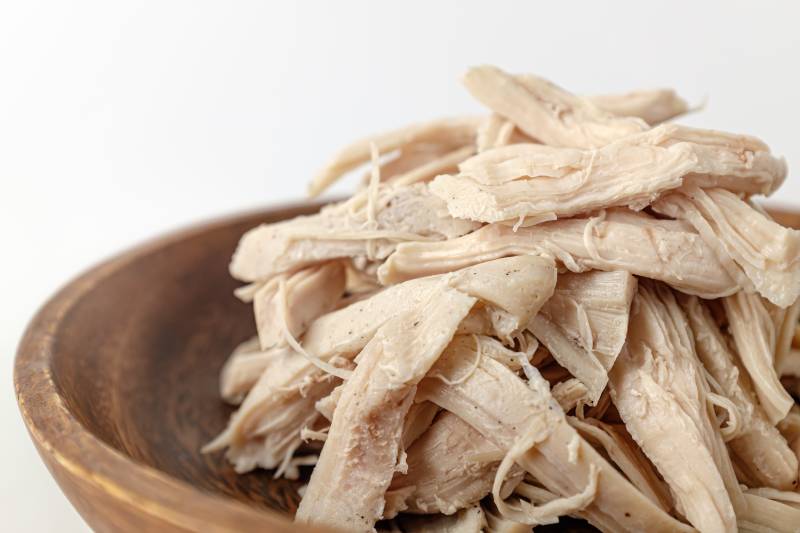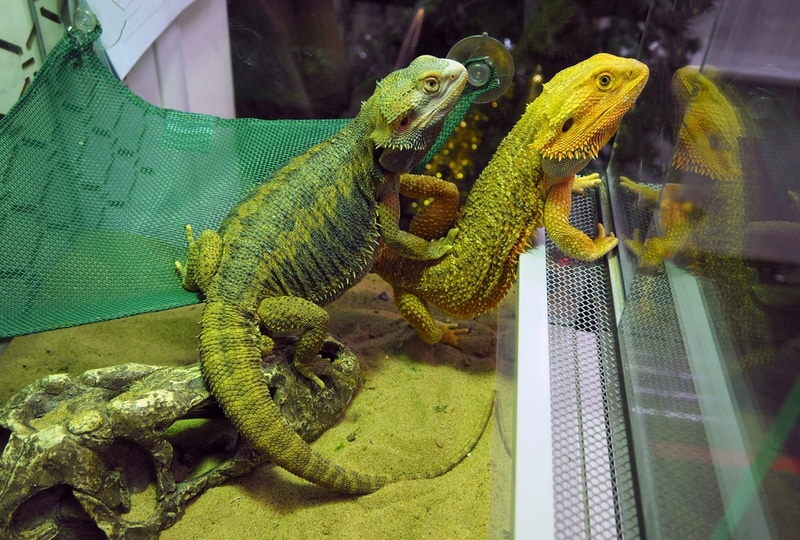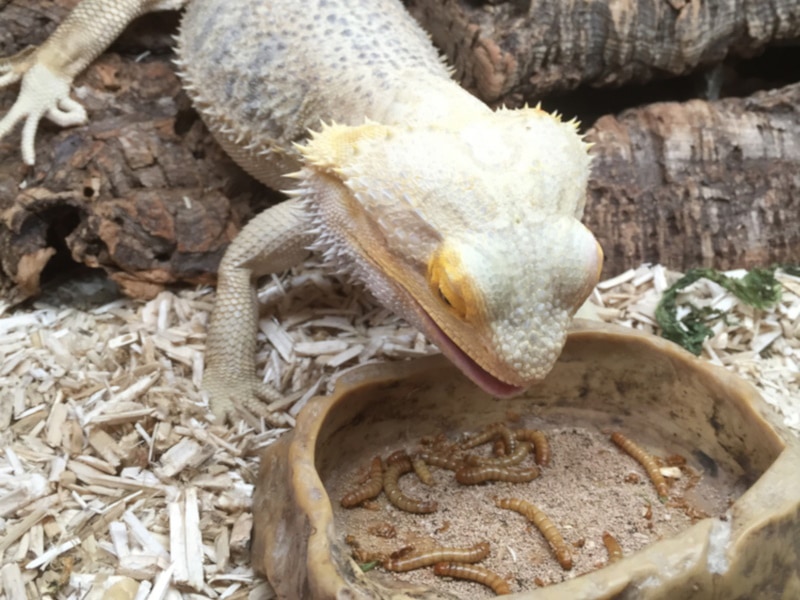Can Bearded Dragons Eat Oranges? Vet-Approved Diet, Risks & FAQ
Updated on

Ever pondered about the similarities you might share with your Bearded Dragon? Consider this: If you’ve ever looked at a juicy orange and thought, “That seems like a delightful treat”, you’re certainly not alone. These little spiky creatures, who hail from the land of Australia, might just be sharing the same thought! Their homeland is pretty versatile—think roasting deserts one moment and leafy forests the next. And just like their habitats, their menu is quite the smorgasbord too.
Being adventurous eaters, bearded dragons will munch on everything from greens to creepy crawlies. Yep, they don’t discriminate—they’re all about that balanced diet! All of this leads us to a very interesting, and, dare I say, juicy question: Can my bearded dragon eat oranges?
Although oranges are not toxic to our little bearded friends, they actually shouldn’t eat them. While oranges are a delightful and nutritious treat for humans, filled to the brim with Vitamin C, they don’t necessarily fit the dietary bill for a bearded dragon.
The Dietary Needs of a Bearded Dragon
The cornerstone of a bearded dragon’s diet should be protein from animals and plant matter.1 Unfortunately, the nutritional composition of an orange does not align with most of their protein requirements. Oranges are principally composed of water and sugar, with carbohydrates and fiber also making up a significant portion. However, when it comes to protein, the quantity present is almost insignificant.
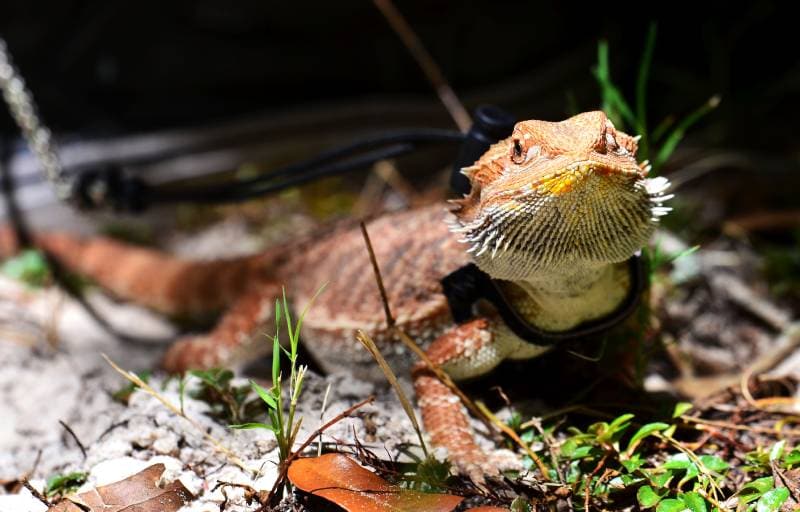
What Are Oranges Made Up Of?
If we delve into the specifics, a 100-gram serving of orange provides only about 1 gram of protein and 0.2 grams of fat. This vast nutritional mismatch makes oranges, and citrus fruits in general, a suboptimal food source to meet the protein and fat requirements of a bearded dragon.
Moreover, citrus fruits like oranges have a high sugar content, which can potentially lead to health issues in bearded dragons if fed in large amounts. They are also acidic, another characteristic that doesn’t play well with the bearded dragon’s digestive system.
Potential Risks of Oranges for Bearded Dragons
The digestive system of your bearded dragon is not designed to handle the high levels of acidity present in oranges. A diet rich in acidic foods like oranges can lead to digestive discomfort, loss of appetite, or in severe cases, the development of long-term health problems.
In addition, the sugar content in oranges is another potential problem. Our bearded dragon friends don’t have a significant need for sugar in their diet. A high sugar intake could lead to obesity, dental problems, and even diabetes. Given that oranges are notably high in sugar, feeding them to your bearded dragon regularly could do more harm than good.
Therefore, it’s not just about what oranges lack, but also about the potential harm they can bring. The high acidity and sugar content make oranges a risky choice for a bearded dragon’s diet. So, even though your bearded dragon might show interest in that bright, sweet-smelling orange, it’s best to opt for safer, more nutritionally appropriate food options to ensure their long-term health and happiness.

What to Do if Your Bearded Dragon Eats an Orange?
Let’s say you turn your back and your bearded dragon manages to snag a juicy piece of ripe orange. You may be concerned and wondering if you need to rush to the vet. Breathe easy because one piece isn’t going to result in a dire situation.
Bearded dragons are hardy and can handle an occasional slip-up. But it’s important to keep an eye on your little buddy for the next couple of days. Watch for any changes, like if they’re not eating as much or if there’s something off about their stool. If they start acting funny or showing signs they’re not feeling great, then it’s time to give the vet a call.
The takeaway? Keeping a close eye on your bearded dragon and their diet will help ensure they stay healthy and happy. So, keep those tempting oranges well out of their sight and reach!
What Can My Bearded Dragon Eat?
Rest assured, the “no-go” on oranges is not a condemnation to a lifetime of bland meals for your bearded dragon. Quite the contrary! The world of potential delicacies for your bearded buddy is as vast as the Outback they originally hail from. There’s a pretty expansive list of fruits, veggies, and crunchy insects that are not just safe but also incredibly beneficial for your pet.
Bell peppers are an excellent choice. Crunchy and colorful, these vegetables can serve as an enticing food item for your dragon. High in vitamins A, C, and a decent amount of fiber, they’re a nutritious feast that aligns well with your pet’s dietary needs.
And how about leafy greens? They’re the unsung heroes of a bearded dragon’s diet. Vitamin-rich foods like collard greens, mustard and turnip greens are chock full of essential nutrients like calcium and vitamins A, C, and K. These provide a solid foundation for your bearded dragon’s nutritional requirements, unlike oranges!
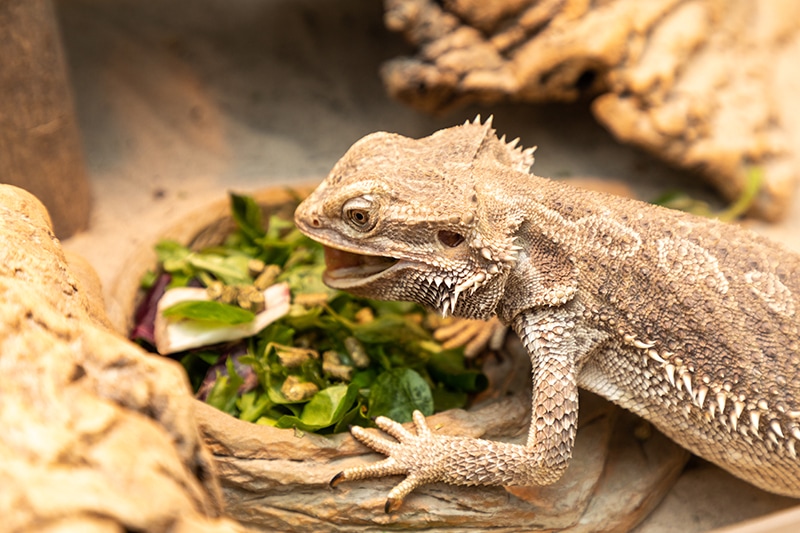
The Greatest Fruits for Your Bearded Dragon
Though oranges might be off the menu, there’s a cornucopia of other fruits that your scaly friend can safely enjoy. For example, strawberries are an excellent treat for bearded dragons. Bursting with vitamin C and helpful antioxidants, these can act as a sweet delight for your furry friend. But remember, because they’re quite sugary, it’s smarter to think of them as a rare reward instead of a regular part of their diet.
Venturing into the land of insects, we can’t overlook the protein powerhouses that are crickets and mealworms. They are not only a tasty treat but also offer a substantial amount of protein, satisfying the high protein requirements of your bearded dragon.
Lastly, remember that variety is the spice of life, and this holds true for your bearded dragon as well. Regular rotation in their diet will ensure they receive a wide array of nutrients and also keep them from getting bored with their meals. From veggies to insects and fruits, there’s a smorgasbord of safer and healthier alternatives to oranges for your bearded dragon to feast upon. So, be adventurous and let your bearded dragon enjoy the diverse flavors of their diet!
Conclusion
As we wrap things up, it’s crucial to remember that while the thought of your bearded dragon delighting in a juicy orange might seem tempting, it’s far from an ideal dietary choice.
Instead, their dietary journey should be paved with a diverse range of protein-rich insects, nutrient-packed vegetables, and a smattering of safe, low-sugar fruits. This variety not only ensures your pet gets the essential nutrients they need but also provides them with a culinary adventure to look forward to at every mealtime.
So, the next time you’re preparing a delicious feast for your precious bearded dragon, remember to leave those juicy, fresh oranges on the kitchen counter!
See also:
- Can Bearded Dragons Eat Turnips? Vet-Approved Diet, Nutrition, & FAQ
- Can Bearded Dragons Eat Papaya? Vet-Reviewed Nutrition Facts & FAQ
Featured Image Credit to: JumpStory


